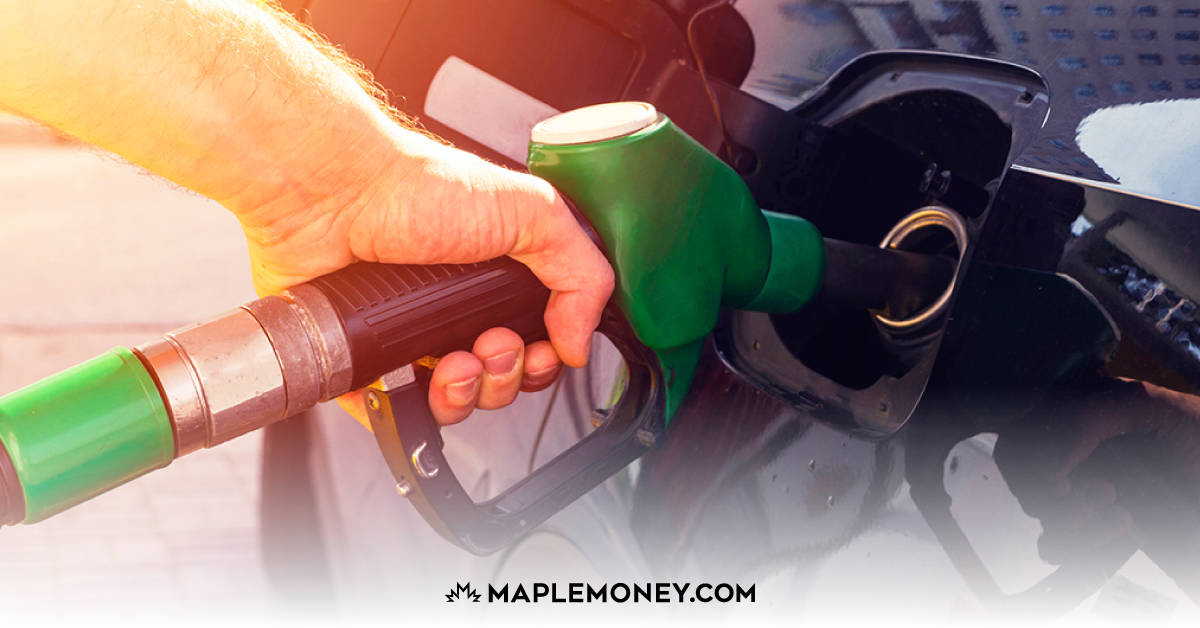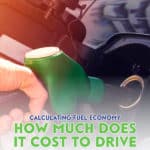Calculating Fuel Economy

It’s been a couple of months since we bought our car. Since I bought my car, I’ve been keeping track of our mileage, as well as how often we fill up in gas. The point of this is twofold. First, I am genuinely curious as to what type of gas mileage I am getting out of our vehicle, driving it the way that we drive it. Second, with that information, I want to be able to create a gas mileage budget – an approximation of how much it is going to cost to drive our car each month.
There’s two bits of information that you need in order to create this type of budget. The first is the number of kilometres you are driving in between filling up your vehicle. There’s two ways to do this. The next time that you fill up your vehicle at the gas station, either write down your odometer reading, or reset the trip odometer. This will give you a base number to start with. Then, just drive normally. Commute, take the kids to school, go to the beach for the weekend. Then, the next time that you fill up, do the same. Write down your car’s total kilometres, or write down your car’s trip odometer reading (before you reset it). If you are working off your car’s total kilometres, then do some quick math and subtract the 1st number from the 2nd. For example, if the 1st reading was 62,345, and the 2nd reading was 62,756, then the number you are looking for is 411. This is the first bit of information that you need.
The second number is a fair bit simpler. It is simply how many litres were consumed in travelling that distance. This number is extremely easy to get, as long as you regularly fill your gas tank up. If you filled up when you took the first odometer reading, and then filled up again at the second, then however many litres of fuel you put into the vehicle at the second fill up is how much fuel was consumed in transit. After you do this a couple of times, you can start creating a chart of your fuel economy. This is what I have so far:
- 478.9 km 39.739L
- 432.8 km 33.804L
- 471.6 km 36.541L
Now, in order to get this into a form that you might recognize and be able to compare to other vehicles, you want to convert this data into the classic Canadian litres per 100km that you will see on new cars for sale. To get this number, simply divide litres by kilometres, and multiply by 100. With that, we get the three numbers 8.28, 7.81 and 7.74. That means that we are consuming, (on average), about 7.94 L for every 100 km that we are driving. That is almost identical to the proposed 7.9L/100km advertised for our vehicle.
For our American friends, to calculate miles per gallon, simply do the same math but replace the kilometres with miles, and the litres with gallons. Also, if you wish to convert your litres per 100km calculation into miles per gallon, you can use this website to do so. With this, I calculated that I am getting just under 30mpg.
What sort of fuel economy are you getting?


Comments
I get about 28 MPG on my car, which Google tells me is about 8.4 litres per 100km. That’s not the most economical car, but it was pretty good when I bought it 20 years ago.
I like to use this excellent online fuel economy tracking tool:
http://www.fuelly.com/
Calculations are automatic and fuel economy history helps you track your car’s performance over time. You can also create a fuel economy ‘badge’ to embed into this blog.
BTW, I noticed the picture is of a Mazda Protege. I drive a Protege5 and am averaging 7.9L/100km in mixed city/hwy driving and occasional autocross racing.
Funny enough, I am currently doing the same exercise with the car I just bought about 2 months ago.
I drive a 2004 Mazda RX-8. I love the car but I don’t like its fuel consumption too much! If you drive it to have fun (read: speed!) you’ll get to 13-14L/100km.
I have recently changed my way of driving it and drop to merely 10L/100 km.
I wonder if there is a difference between the quality of gas (super extra fuel vs regular one)?
I drove to the countryside last weekend, 350 km roundtrip with less than 16 L. Yep, that’s a whopping 4,6 L/100 km! And I don’t drive either a Smart or a Prius…
Now, my question is: Why don’t more people drive diesel engine cars? It makes so much sense.
I have tracked my mileage for several years. Currently on my 2007 Civic I get 7-7.1 l/100 km (33+ mpg) in mostly big city driving. Recently did about 700 km if highway driving and got around 6.2 l/100 (38-39 mpg). If I drive about 5 km/hr under the speed limit, I get about 5.6 l/100 – but that’s hard to do for me!
If my numbers start to change significantly, then I take that as a symptom of a problem – tire pressure? fuel injectors? spark plugs? something worthy of investigation.
Also remember to check tire pressure regularly – monthly is ideal – and with your own gauge (less than $10 at Cdn Tire or similar) – it can change your fuel efficiency dramatically.
There are great apps for mobile devices that can do this and a lot more for you. I personally have been using a free version of Gas Cubby on my Iphone since I bought my truck a few months ago.
Good news is the app works great, tracks fuel and maintenance expenses, reminds about scheduled maintenance etc.
It spits out some other great info as well such as cost per day, km per day, cost per km etc etc etc..
There are apps lots of apps of this sort so try a couple and decide on the one you like.
The bad news out of all this data that I now have before me is that my truck has been averaging 18.90L/100km (OUCH) and cost me $12.27 a day in fuel……. Might be time to rethink my truck (pry it from my cold dead hands).
Mike
I think I’m like most people and I’ve rarely, ever calculated my fuel economy unless gas was really high and my pockets were empty.
I used to keep proper records of all my driving expenses. The stop start of peak hour traffic is the worst thing for fuel consumption. As Robert said tyre pressure also makes a huge difference.
I spent $50,000 on my truck including maintnance & fuel since I bought it 10 years ago…can you believe some people still think a vehicle is investment…
I did this for a while with my truck. I work about a 1.5 km from my house. I could not believe the amount I was spending driving to work. I decided to start walking and now I only need to fill up my tank every three weeks.
Hi,
I use a free software Oktan to track my vehicle fuel consumption. This application is easy to use and give you nice monthly statistic. You could try it. It can be found on next address: http://www.malopero.com/oktan
A couple of things to remember. The engine will loosen as you put miles on it and deliver a better fuel economy as it does so. Secondly how you drive and where you drive to is the most important factors and if you use AC and tire pressure can play an equally important role.
Here is a tip on how to save fuel. Always check your tire pressure. Tires lose air due to time and temperature, under inflated tires have more rolling resistance. Thus, your car will burn more fuel to keep moving. That is why I find it necessary to check tires pressure at least once a month.
I had my radiator replaced on my Dodge SX 2.0 a couple years ago (part of a collision repair) and they didn’t put any fluid in the new radiator, so the engine overheated and blew the head gasket. The shop that did the work sent the car into the dealer to have the head gasket replaced.
ever since that time my engine performance has gone down hill. I’ve gone from around 9L/100km up to 16L/100km.
I’m getting between 250-280km on a tank and I get about 45-50L in the tank although its only supposed to fit 41L.
Someone told me that if the engine got hot enough to blow a head gasket, the block itself would have been permanently damaged and I’ll be lucky to get 3 more years out of it. Could this be true? Does it make any sense? Should I try to go back to the body shop who messed up the radiator, to get them to have the engine replaced? Ironically, when he was showing me the car after the initial repairs were done, he pointed out the new rad and I actually asked hime if it had been topped up with new fluid, and he said, “oh yeah, for sure.” He assumed it had been done, but like my momma always said, “when you make assumptions, you make an ass out of you and me.
Anyways, I would really appreciate any advice. I’m trying to decide if I should “invest” in a newer more fuel efficient vehicle for work, or get the body shop to replace the engine, because I’m paying a lot for gas every month. I’m in sales and this year I’m going to be doing significantly more driving, and in the city. I’m spending about $300/month now but looking at $4-500/month as I am driving more and gas prices are going up.
please advise.
thanks,
Michael [email protected]